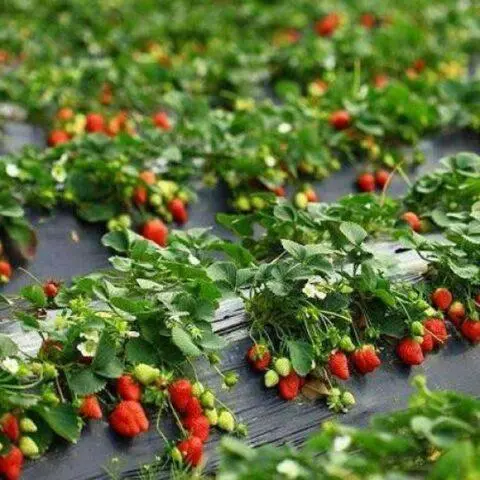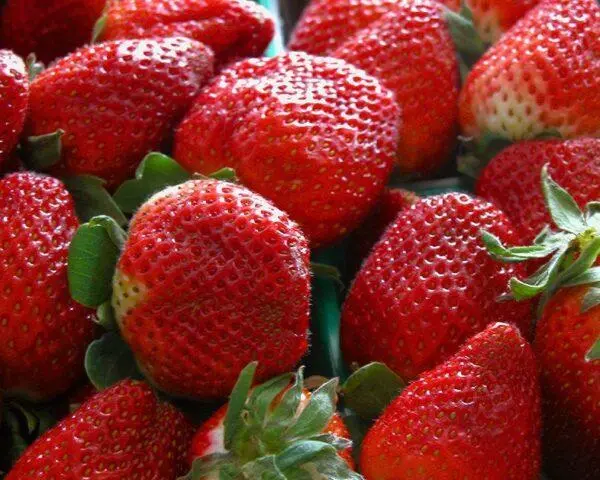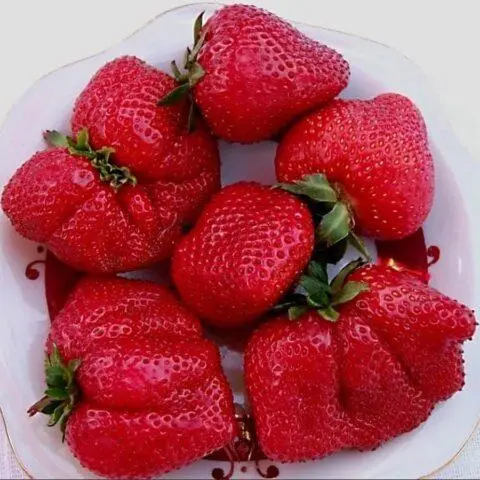Contents
Strawberry anthracnose can lead to the death of the entire berry plantation. To cope with the disease, it is necessary to recognize its symptoms in time.
Description of anthracnose with a photo
Strawberry anthracnose, or black spot, is a disease caused by the phytopathogenic fungus Colletotrichum acutatum. It appears primarily on the mustache and upper parts of the stems, leaves oval depressed red-brown sores about 2 mm in diameter. Over time, these spots turn black, grow and merge with each other, the leaves and shoots of strawberries dry up and die.
During the flowering period of the culture, anthracnose leads to deformation of the ovaries and whitening of the cups in the emerging fruits. Ripening strawberries are covered with brown marks with a dark border. In dry and hot summers, the berries simply dry out, and in rainy weather, a yellow or pinkish slimy coating forms on them, inside which the mycelium of the fungus is contained.
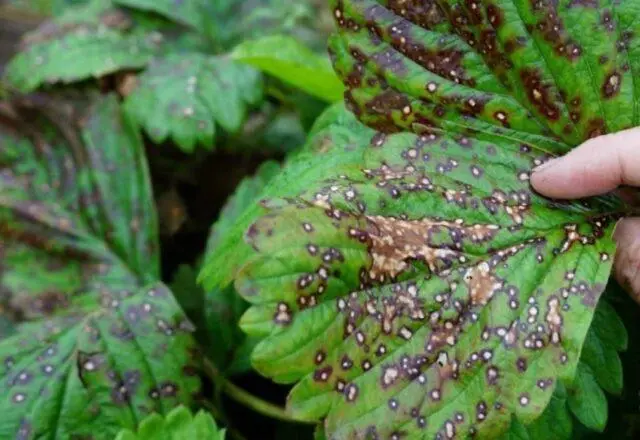
Launched strawberry anthracnose sooner or later leads to drying of the roots and death of the plant.
Anthracnose is a great danger to beds and can destroy up to 80% of the crop. In external manifestations, the disease is similar to late blight or verticillium. But to distinguish it is quite simple – you need to moisten the affected strawberry leaf and place it in an airtight container. If an orange-pink mold forms on the plate after 2-3 days, we are talking about anthracnose.
Treatment of strawberry anthracnose with chemicals
Anthracnose strawberry disease responds well to treatment in the early stages. It is customary to use, first of all, chemical preparations, they do not harm the culture, but effectively fight the fungus.
Ridomil Gold
The fungicidal preparation contains the active ingredients mancozeb and mefenoxam. Effectively fights anthracnose and prevents re-infection of strawberries, does not wash off with rain after drying.
To prepare a working solution, dilute 25 g of the drug in 10 liters of water. Spraying is carried out three times per season, the last of which should take place no later than two weeks before harvest.
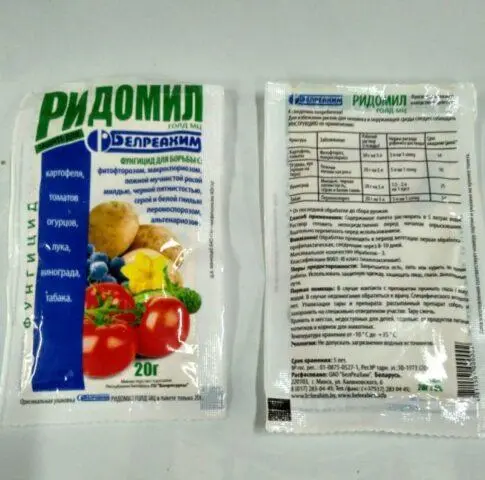
Ridomil Gold is dangerous for pets and requires careful use
Previcur Energy
The therapeutic effect of the drug is provided by aluminum fosethyl and propamocarb hydrochloride in the composition. To eliminate anthracnose, a working solution is made at the rate of 1,5 ml of the product per 1 liter of water. It should be used immediately after preparation, since the drug is not stored for a long time.
Spray strawberries with Previkur Energy in the morning or evening in the absence of bright sun at a temperature of about 15-20 ° C. The drug quickly destroys the pathogenic fungus and also stimulates the growth of bushes.
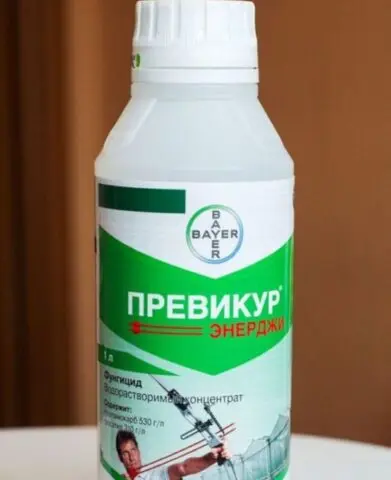
Previcur Energy is non-toxic to animals and humans
Fundazole
A popular fungicidal agent contains the substance benomyl and is suitable for the prevention and treatment of strawberry anthracnose. To prepare the solution, first 5 g of the drug is diluted in 250 ml of water, and then topped up to a volume of 5 liters.
Fundazol should be used for spraying twice a season, no later than a couple of weeks before picking berries. It is best to use the drug to prevent anthracnose or when the first symptoms appear. In this case, the fungicide quickly eliminates the pathogen and does not allow it to seriously harm the strawberries.
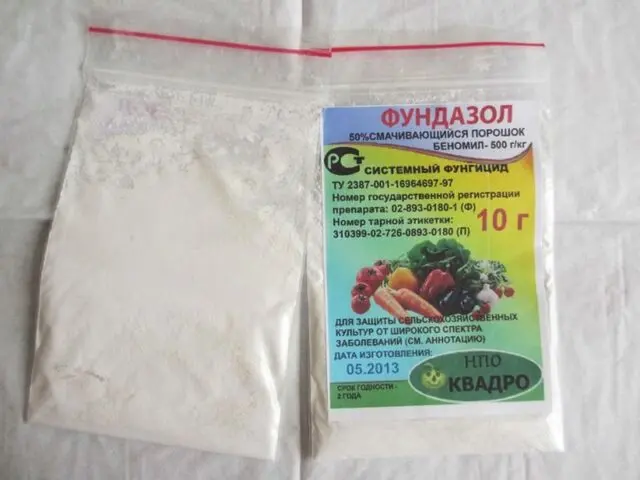
Fundazol is dangerous to human health, so spraying is carried out with goggles and a respirator
Kuproksat
The drug includes in its composition the active substance copper sulfate pentahydrate. It gives a positive effect immediately after application, does not harm humans and animals, protects strawberries from re-infection with anthracnose.
To prepare a fungicidal solution, you need to stir about 3 g of powder in 50 liters of water, and then add up to 10 liters. The tool is used to spray the beds several times per season with breaks of ten days. At the same time, it is possible to harvest strawberries in 3-4 days after the next processing.
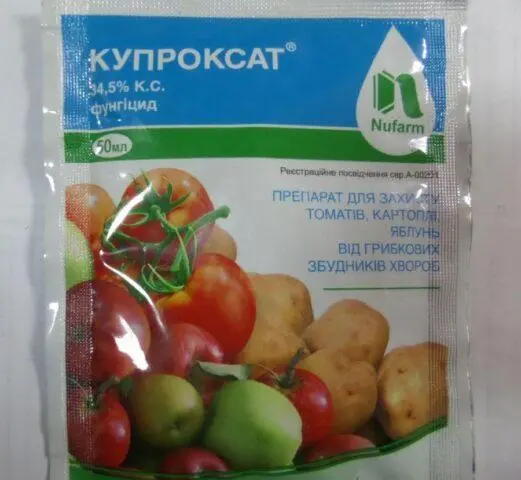
Kuproksat provides strawberries with protection against anthracnose for three weeks
Is fast
The drug based on difenoconazole is suitable for treating strawberries from anthracnose at a temperature of 15-25 ° C. The treatment solution is done like this – about 3 ml of the product is diluted in a bucket of water and mixed.
You need to spray the beds three times at weekly intervals. Usually, the first treatment is carried out in early spring, the second before flowering, and the third after another ten days. The drug penetrates into strawberry tissues already two hours after spraying and suppresses the anthracnose pathogen. A full result can usually be achieved after three weeks.
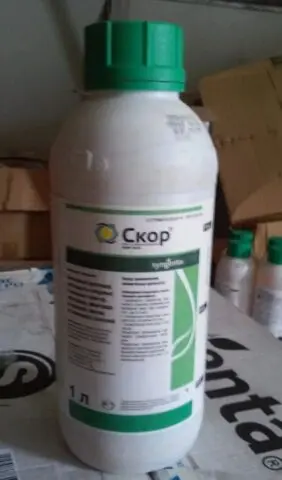
Spraying with Skor additionally increases the yield of strawberries
How to treat strawberry anthracnose with folk remedies
You can treat strawberries from black spot in autumn or spring using home remedies. Their effectiveness is weaker than that of industrial fungicides, therefore, it is necessary to use such funds for prevention or with weak damage to the bushes.
Soda
Baking soda does not cause any harm to strawberries, pollinating insects or humans, but it inhibits the vital activity of pathogenic fungus. The spray solution is done like this:
- Pour 10 liters of slightly warm water into a bucket.
- Throw in a glass of soda.
- Stir until the powder dissolves.
The finished product is used once every two weeks for the prevention of anthracnose and weekly if symptoms are present.
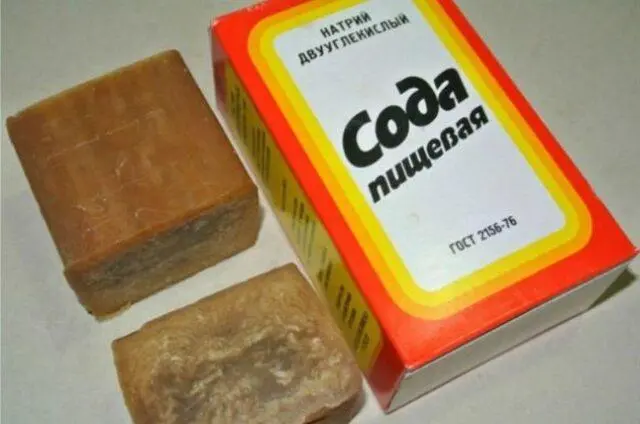
To increase stickiness, you can add a little soap to the soda solution.
Garlic
Regular garlic has good fungicidal properties. A solution based on it can be made according to the following recipe:
- A few peeled cloves are rubbed on a grater.
- 200 g of garlic gruel is poured into 10 liters of water.
- Leave the mixture for a day in a closed bucket in a dark place.
- Strain through cheesecloth to remove sediment.
It is necessary to spray strawberries with infusion daily for three days in the evenings.
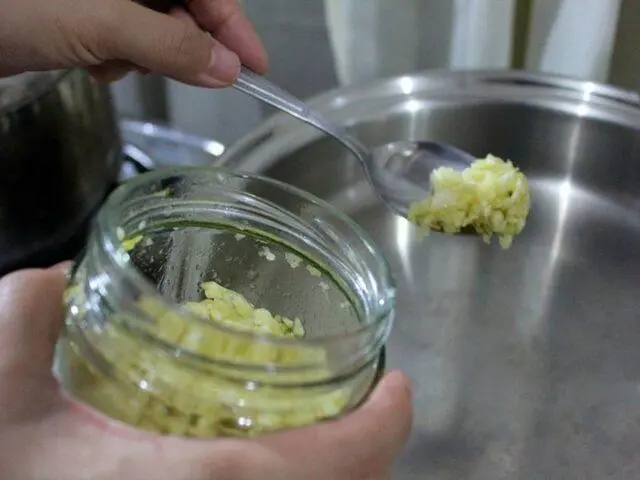
Garlic infusion not only suppresses the anthracnose fungus, but also repels pests from beds with strawberries
Iodine
A homemade solution with the addition of iodine has good healing and strengthening properties. They do it like this:
- Grate a bar of laundry soap on a coarse grater.
- Stir 20 g of chips in 10 liters of warm water.
- Add 30 drops of iodine.
- Once again mix the product.
It is necessary to spray strawberries with the resulting solution 3-5 times per season at intervals of three days.
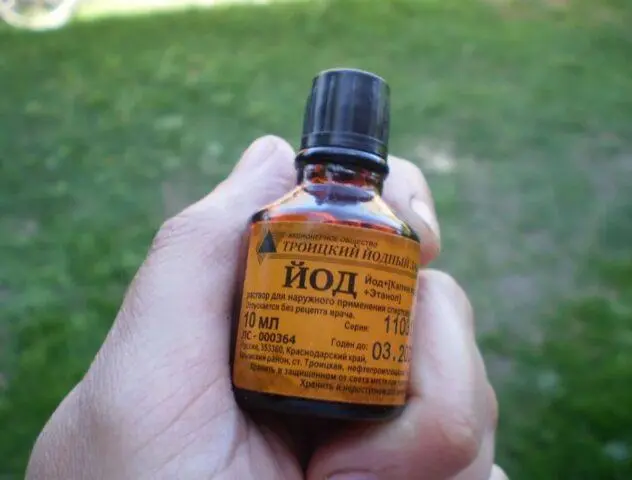
Iodine solution serves for strawberries not only as a remedy, but also as a top dressing.
Dandelions
At the first symptoms of anthracnose, dandelion decoction can be used to treat the disease. Make it according to this recipe:
- Carefully grind 800 g of fresh stems of the plant.
- Pour 2 liters of water in an enamel pan.
- Boil on low heat for ten minutes.
- Strain the broth and top up to 10 liters.
The product is used for spraying every other day 4-5 times during the season.
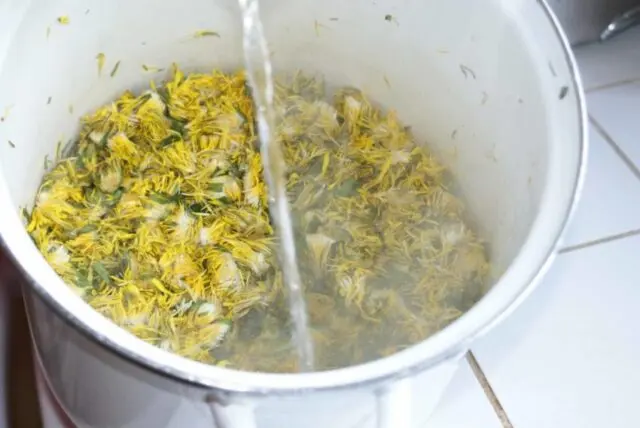
Dandelion decoction is recommended to be used simultaneously with industrial fungicides.
Boric acid
With strawberry anthracnose, boric acid has a good effect. The working solution for spraying bushes is made according to the following scheme:
- Stir in 10 liters of water a large spoonful of copper sulfate.
- Add 2 g of ferrous sulfate and boric acid.
- Contribute about 10 g of potassium sulfate.
- Thoroughly mix the components.
Use the product for a single spray. It is carried out in cloudy but dry weather in the morning or after sunset.
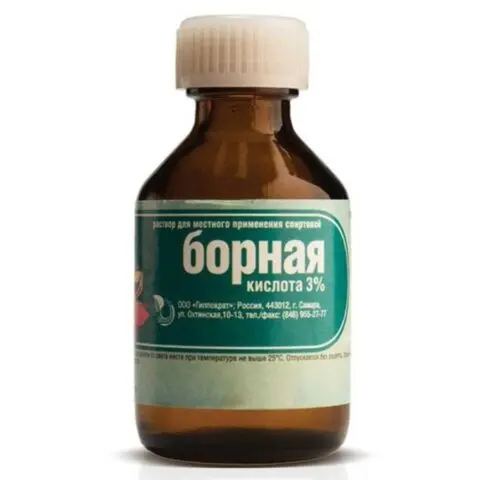
Boric acid increases the immunity of strawberries and prevents the re-development of anthracnose
Anthracnose prevention
It is almost impossible to cure strawberries from anthracnose in the later stages. It is recommended to pay attention to the prevention of the disease, which, in principle, prevents the development of the disease:
- buy only healthy and strong seedlings from trusted suppliers;
- treat strawberry roots with fungicides before planting in the ground;
- shed the soil in the garden with disinfectant solutions to eliminate a possible fungus;
- regularly loosen the soil and remove weeds;
- plant strawberry bushes at a distance of about 30 cm from each other so that they receive enough sunlight and oxygen;
- correctly dose watering and prevent waterlogging or drying out of the soil.
As part of the prevention, it is recommended to spray the bushes four times with fungicidal agents from early spring until the harvest begins to ripen. With the onset of autumn, it is necessary to remove plant debris from the beds so that the spores of the fungus cannot wait out the winter in fallen leaves and fruit residues.
Strawberry varieties resistant to anthracnose
Strawberry varieties that are initially resistant to this disease are the least affected by anthracnose. Several types are the most popular.
- Zhang Ji. Japanese remontant strawberries produce strong and large conical berries up to 20 g. The variety is very sweet, with a pleasant long aftertaste, suitable for growing in the garden and in greenhouses.

The downside of Zhang Ji’s strawberry is its softness – the variety is not grown for sale
- Xiang Ye. Another Japanese variety bears red berries with slightly orange flesh. It has a sweet honey taste, does not crumple. Yields continuously throughout the summer and into autumn.

Strawberry Xiang Ye is additionally resistant to powdery mildew
- Vikoda. Late non-repairable strawberries ripen in the middle of summer, give large juicy berries up to 40 g by weight. The fruits are dark red, with good firmness.

Strawberry Vikoda suitable for transport
When growing varieties with high immunity, it is still necessary to pay attention to agricultural technology and disease prevention. With illiterate care, any strawberry can suffer from fungus.
Conclusion
Strawberry anthracnose develops very quickly and negatively affects yield. You can notice the disease by the characteristic symptoms, with an early start of treatment, the fungus can usually be dealt with.










